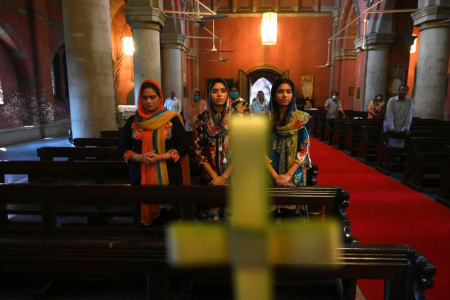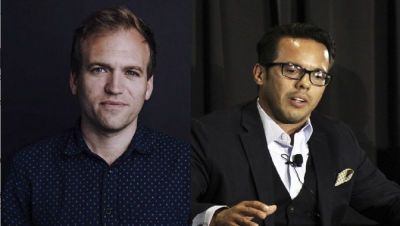Evangelical leaders urge Congress to include foreign aid in next COVID-19 relief package

The National Hispanic Christian Leadership Conference and the Congress of Christian Leaders are urging members of Congress to address a “once-in-a-century” crisis by increasing foreign COVID-19 assistance in any potential new COVID-19 relief bill.
NHCLC President the Rev. Samuel Rodriguez along with CCL President Johnnie Moore released a joint statement last week asking Congress to provide additional assistance to help those across the world struggling during the pandemic. The leaders estimate that global needs could exceed $25 billion.

Rodriguez, a leading Hispanic evangelical figure and pastor of New Season Church in Sacramento, California, joined Moore, an evangelical communications executive who also serves on the U.S. Commission for International Religious Freedom and has met with several high profile world leaders in recent years, in issuing the statement.
“While normally reticent to support the level of government spending that has been contemplated and instituted during the Covid-19 relief packages until now, we recognize that this virus presents a unique challenge to the United States and to the world,” the joint statement reads.
“This is a once-in-a-century crisis that requires a once-in-a-century response. That response must also include additional U.S. foreign assistance.”
Their statement comes as there were talks last week between Democrats and Republicans on a new coronavirus relief package as the additional $600-per-week unemployment benefit included in the first COVID-19 relief package expired at the end of July.
But those talks stalled after congressional leaders and administration officials met last Friday. Senate Majority Leader Mitch McConnell is pushing for Democrats and the White House to resume negotiations.
Additional funding for foreign assistance, Moore and Rodriguez say, would go to support humanitarian aid projects managed by the President's Emergency Plan for AIDS Relief, the U.S. Agency for International Development, and other U.S. and international agencies.
Moore and Rodriguez expressed their deep concern that the congressional effort to take care of domestic needs during the pandemic “risks making a terrible mistake by inadequately increasing U.S. foreign assistance funding.”
“Our call for generous, additional funding is informed by our travels around the world and by the networks of international Christian communities whom we know and we serve,” the statement reads.
“Fragile parts of many countries, and especially in Latin America and Africa, came to this struggle with inadequate healthcare systems to begin with.”
The evangelical leaders say that COVID-19 has “exacerbated those problems while presenting additional strains on society.”
“[A]nd as usual, it is the people at the bottom rungs of the socioeconomic ladder who are bearing the heaviest load: the poor are becoming poorer, the sick are becoming sicker and the most vulnerable are at greatest risk,” the statement continued.
Moore and Rodriguez point out that their advocacy for religious freedom and human rights has acquainted them “firsthand” with the increased efforts by the Chinese government and other “malign actors” to “threaten America’s unrivaled role in the world.”
“Without question, the Chinese Communist Party is exploiting this crisis, a crisis for which it bears much responsibility, in order to advance its international ambitions,” the leaders stressed. “It is in the critical, national security interests of the United States to ensure that China isn’t allowed to use humanitarian assistance to force its Communist ambitions upon fragile countries during this vulnerable moment.”
Moore and Rodriguez fear that without an immediate humanitarian response, the pandemic will cause millions of deaths in fragile and conflict-affected countries around the globe. They contend that the pandemic also poses a “serious threat” to the progress made in the fights against HIV/AIDS, tuberculosis and malaria.
The World Food Program estimated earlier this year that the pandemic could result in the doubling of the global food crisis by the end of the year. The organization estimates that the number of people facing acute food insecurity could rise from 135 million in 2019 to 265 million in 2020. Additionally, a locust crisis in Africa has also threatened food security.
According to the State Department, the U.S. government is "deploying the full range of U.S. resources to contain and prevent the spread of COVID-19 not just at home, but also across the globe."
A statement from the agency explains that since the outbreak, the U.S. has announced over $1.5 billion in the State Department and USAID funding for emergency health, humanitarian, economic, and development assistance through funding provided by Congress.
Specifically, that aid has been aimed at helping governments, international organizations and nongovernmental organizations combat the pandemic by improving public health education, protecting healthcare facilities. According to the State Department, that funding has increased laboratory, disease-surveillance and rapid-response capacity in more than 120 countries.
Additionally, USAID and the Centers for Disease Control and Prevention have worked together to provide $2.4 billion in emergency supplemental funding allocated by Congress to "support health systems, humanitarian assistance, and economic, security, and stabilization efforts worldwide."
"The U.S. is by far the most generous and reliable contributor to crisis response and humanitarian action through UNICEF, the World Food Program, and dozens of international organizations," the State Department statement reads. "Our leadership enables these organizations to fight disease and ultimately, protect Americans."
NHCLC is America’s largest Hispanic Christian organization that has over 40,000 certified member churches through the U.S. and Latin America. The Congress of Christian Leaders is an interdenominational body founded in 2018 that seeks to foster unity and serve growing Christian movements across the globe.





















